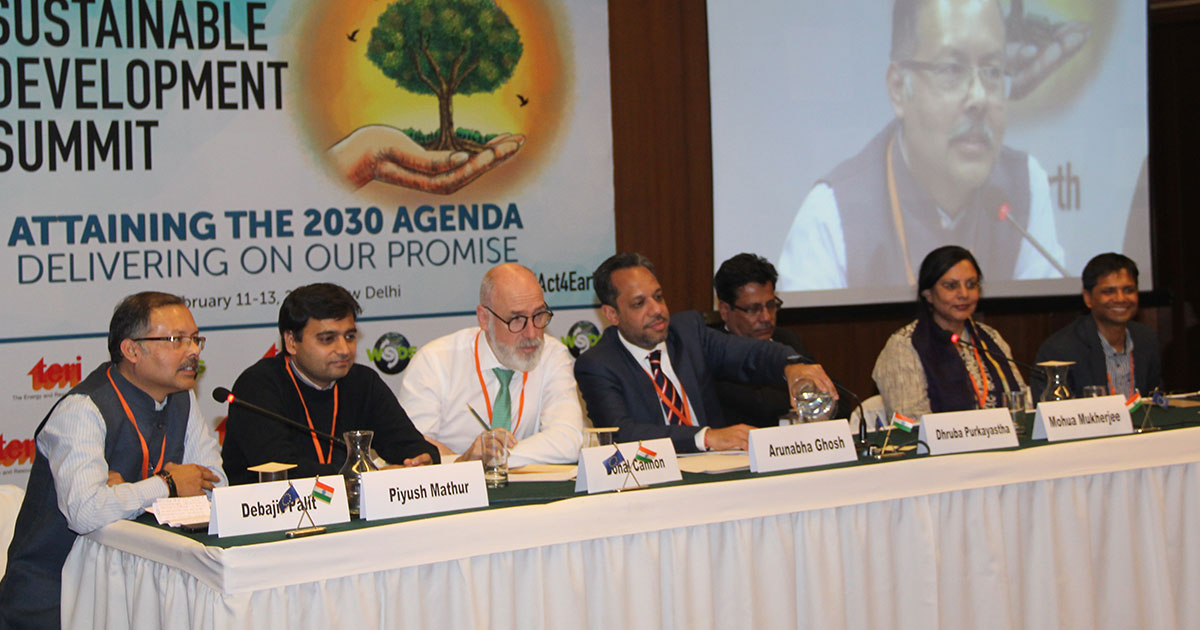The field is open for off-grid power entrepreneurs, but the grid is here to stay

Access to decentralised solar energy solutions, especially for remote, low-income areas, not only provides opportunities for clean lighting and cooking in households, but also greatly improves energy access for irrigation and other agricultural services, apart from income-generating opportunities such as tailoring, agricultural irrigation and waste-water purification, food processing, equipment maintenance and repair services, light manufacturing etc.
In recent years, there has been a rapid growth in low-voltage, highly energy efficient applications and a widespread adoption of appliances compatible with decentralised solar energy in many developing countries. This new market has the potential to not only provide access to clean and affordable energy in remote areas, but also for income generation through solar entrepreneurship.
It was against this background that the thematic track ‘Complementing grid with decentralised solar energy: How to support solar entrepreneurship’ was held at the World Sustainable Development Summit 2019 on 11th February. Partnered by India-EU Clean Energy and Climate Partnership (CECP), International Solar Alliance (ISA,) and Pricewaterhouse Coopers, the session had a mix of Indian and European panellists discussing the issue.
Dr Amit Kumar, Senior Fellow and Senior Director, TERI, delivered a welcome address, followed by Edwin Koekkoek, Counsellor, Delegation of EU to India, and Mohua Mukherjee, Programme Ambassador, ISA. This was followed by opening remarks by session moderator Dr Arunabha Ghosh, Founder-CEO, Council on Energy, Environment and Water (CEEW), New Delhi. The other panelists included Mr Dónal Cannon, Head of Regional Representation for South Asia, European Investment Bank; Mr Dhruba Purkayastha, Director, US-India Clean Energy Finance, Climate Policy Initiative; Mr Vinay Rustagi, Managing Director, Bridge to India; Mr Piyush Mathur, Chief Executive Officer, Simpa Networks; and Mr Debajit Palit, Director and Senior Fellow, Rural Energy and Livelihoods Division, TERI.
Mr Cannon painted an optimistic picture in his presentation, ‘Setting the scene: Decentralised solar energy entrepreneurship and SDGs – the potential and the challenges’. He said the grid vs distributed renewables paradigm of looking at the scenario is an artificial solution. “The future is going to be both.”
The panelists held that the need for decentralised solar energy system also arises broadly from three evolving trends. One, there is a growing need for mobile energy for purposes such as irrigation in rural areas, and to power car batteries in the face of a larger share of EVs envisaged, in urban areas.
Two, the traditional role of the central grid may undergo a major change. While grid might become a marketplace for buying and selling power, power distribution and aggregation will provide newer opportunities for local entrepreneurs including households and enterprises. Hence, newer business opportunities for local players will evolve.
Third, there is a high level of intelligence being fed into energy systems that enables monitoring and management of energy generation and consumption. These evolving trends call for a more focused approach towards leveraging decentralised solar energy solutions that are easy to plug and use. In the future, decentralised energy solutions will play a complementary role by enabling power distribution companies (discoms) to enhance the share of renewable energy. Further, decentralised solar energy solutions could also play a supplementary role in regions where there is a shortage of power supply.
The discourse during the session delved into need for adaptive business models and innovative technology solutions that can withstand evolving consumer sentiments and market dynamics. The panellists also held that finance and institutional capacity building will play a pivotal role in furthering the penetration of decentralised solutions. They concluded with the view that there is a strong potential for both the grid and the decentralised energy systems to co-exist and remain relevant in both rural and urban markets.